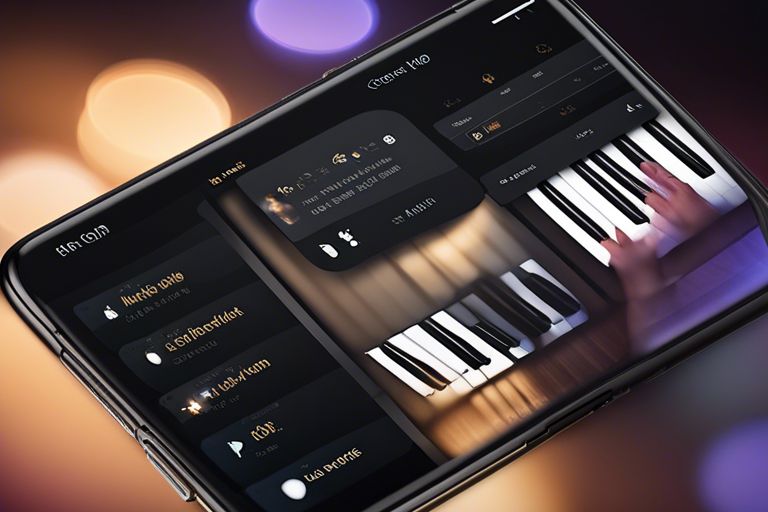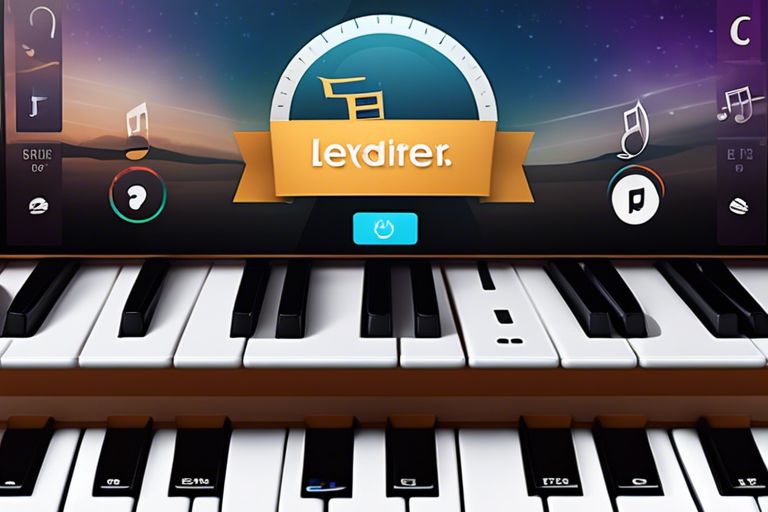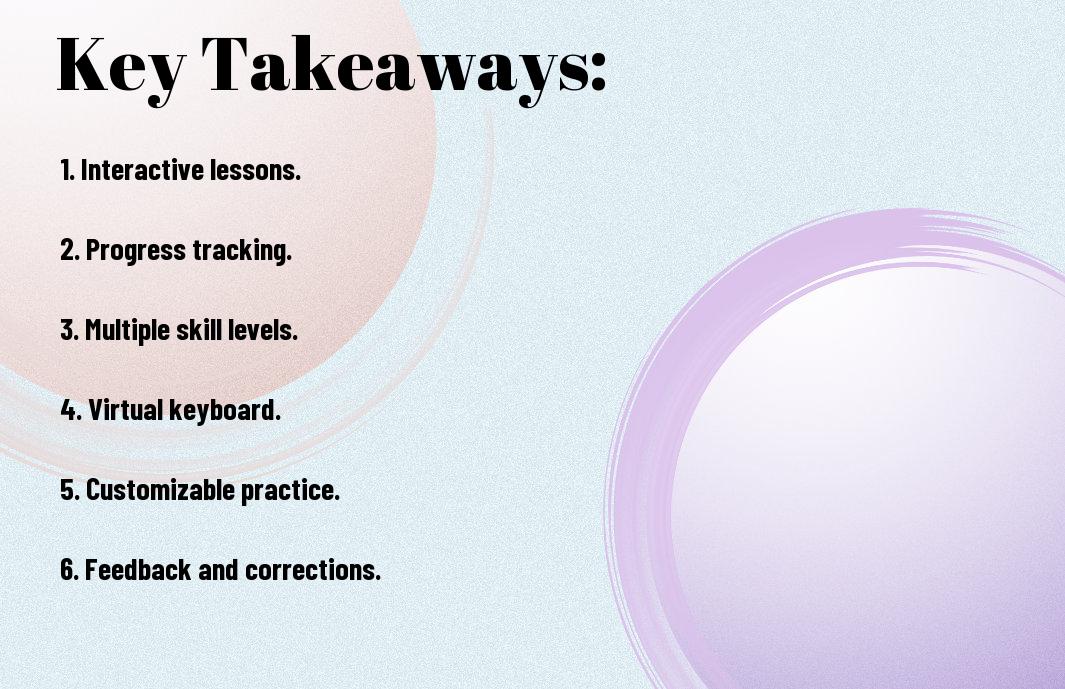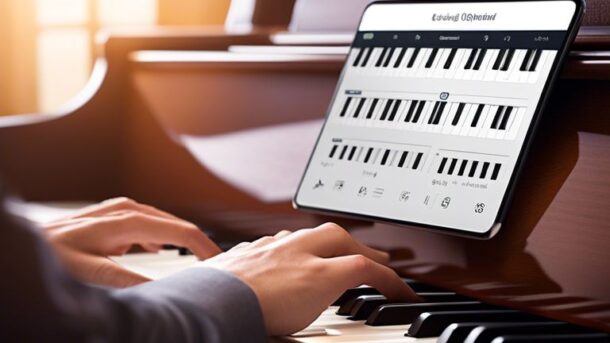With a multitude of piano learning apps available, it can be overwhelming to navigate through them all. When choosing a piano learning app, you must look for key features to ensure successful learning. From interactive lessons and real-time feedback to customizable practice sessions and a wide variety of songs to play, a good piano learning app should have all the imperative tools to help you master this beautiful instrument at your own pace. Let’s explore the must-have features that will elevate your piano learning experience to new heights.
Key Takeaways:
- Interactive Lessons: A good piano learning app should offer interactive lessons that engage users and provide feedback on their progress.
- Customized Learning Paths: The app should allow users to set their own learning goals and provide a personalized learning path based on their skill level and objectives.
- Practice Tools: The app should include practice tools such as metronome, recording features, and sheet music to help users improve their skills outside of structured lessons.
Essential Features for Effective Learning
Interactive Lessons and Exercises
Interactive lessons and exercises are crucial for effective piano learning. Through interactive features, you can engage with the material in a hands-on way, which helps improve your understanding and retention of key concepts. These features could include interactive keyboard simulations that allow you to practice playing notes and chords, as well as interactive lessons that adapt to your skill level and pace.
Personalized Progress Tracking
For efficient learning, personalized progress tracking is imperative in a good piano learning app. By keeping track of your progress, you can see how far you’ve come, which areas you need to focus on, and set achievable goals for improvement. These features can include personalized practice recommendations based on your strengths and weaknesses, as well as regular assessments to monitor your development over time.
A good personalized progress tracking system not only motivates you to keep practicing but also provides valuable insights into your learning patterns and areas that need more attention. With this information at your fingertips, you can make informed decisions on how to adjust your practice routine for maximum results.
Engaging Practice Tools
Virtual Keyboard and Real-time Feedback
One vital feature that a good piano learning app should have is a virtual keyboard that allows you to practice anytime, anywhere. This tool enables you to play notes and chords on your device’s screen as if you were playing on a real piano. Additionally, real-time feedback is crucial for your improvement. The app should provide instant analysis of your playing, pointing out areas for improvement such as hand positioning, timing, or note accuracy.
Song Library and Play-along Functionality
One engaging aspect of a piano learning app is its song library and play-along functionality. A diverse library of songs across different genres and difficulty levels keeps your practice sessions exciting and varied. The play-along feature allows you to practice playing along with pre-recorded tracks, helping you develop your sense of rhythm and timing.
Keyboard Understanding the theory and practice of playing songs in the app’s library is a great way to enhance your skills. By learning to play different styles and genres, you can broaden your musical horizons and improve your overall piano proficiency. The play-along functionality further immerses you in the music, making practice sessions more engaging and enjoyable.

Guidance and Support
Video Tutorials and Demonstrations
Tutorials are an necessary component of any good piano learning app. They provide you with visual and auditory guidance on how to play different pieces, techniques, and exercises. Video tutorials and demonstrations allow you to see and hear the music being played, providing a clear example for you to follow. This visual aid can help you understand the hand positioning, movement, and overall technique required to play the piano effectively.
Access to Expert Teachers and Mentors
In addition to video tutorials, having access to expert teachers and mentors through a piano learning app can significantly enhance your learning experience. These professionals can provide personalized feedback, guidance, and support to help you improve your skills and overcome any obstacles you may encounter. Whether it’s through live online lessons, pre-recorded video feedback, or messaging features, having access to expert teachers and mentors can take your piano learning journey to the next level.
Video calls with teachers can give you the opportunity to ask questions, receive real-time feedback, and have a more interactive learning experience. This direct access to knowledgeable and experienced piano instructors can help you progress more efficiently and effectively in your musical journey.
Customization and Adaptability
Adjustable Difficulty Levels and Pacing
Not everyone learns at the same pace or with the same level of difficulty. A good piano learning app should allow you to adjust the difficulty levels and pacing to suit your individual learning style. This means that whether you are a beginner just starting out or an advanced player looking to refine your skills, you can tailor the app to meet your specific needs.
Learning Style Accommodations (Visual, Auditory, Kinesthetic)
To cater to your unique learning style, it’s important for a piano learning app to accommodate different preferences such as visual, auditory, and kinesthetic learning. Visual learners may benefit from interactive graphics and video tutorials, while auditory learners might prefer audio cues and practice sessions. Kinesthetic learners, on the other hand, may require hands-on activities and interactive exercises to effectively grasp concepts.
Adaptability is key when it comes to learning a new skill like playing the piano. A good app should be able to adapt to your preferred learning style, ensuring that you receive the most effective instruction and practice sessions tailored to how you learn best.
Adjustable features that cater to visual, auditory, and kinesthetic learning styles can help you make the most out of your practice sessions and improve your piano skills more efficiently.
Motivation and Accountability
Despite your best intentions, practicing the piano every day can be a challenge. A good piano learning app should help keep you motivated and hold you accountable for your progress. When choosing an app, look for features that will inspire you to keep practicing and track your improvement over time.
Reward Systems and Achievements
On your piano learning journey, it’s important to have a sense of accomplishment and progress. A good app will offer reward systems and achievements to celebrate your milestones, whether it’s mastering a difficult piece or completing a certain number of practice sessions. By earning virtual rewards and unlocking achievements, you will stay motivated to continue learning and growing as a pianist.
Social Sharing and Community Features
On your musical quest, it can be beneficial to connect with others who share your passion for the piano. Some apps offer social sharing and community features that allow you to interact with fellow users, participate in challenges, and receive feedback from peers. By being part of a community of like-minded individuals, you can stay inspired, learn from others, and keep yourself accountable for your progress.
Accountability plays a crucial role in your piano practice routine. When you have a supportive community cheering you on and holding you accountable, you’re more likely to stay committed to your goals and push yourself to improve. So, don’t underestimate the power of social sharing and community features in a piano learning app.

Technical Requirements and Compatibility
Once again, if you are considering developing a piano learning app, it is crucial to understand the technical requirements and compatibility aspects. For a comprehensive guide on this topic, you can refer to Best Piano Learning Apps: How To Develop One for You?.
Device and Platform Support
Requirements for device and platform support are vital when developing a piano learning app. Your app should be compatible with various operating systems such as iOS and Android to reach a broader user base. Ensuring that the app functions seamlessly across different devices, including smartphones and tablets, will enhance user experience and accessibility.
Offline Access and Syncing Capabilities
Requirements for offline access and syncing capabilities are vital for a good piano learning app. Users should be able to access lessons and practice offline, allowing them to learn at their convenience without requiring a constant internet connection. Syncing capabilities enable users to track their progress across devices, ensuring a seamless learning experience no matter where they are.
Device synchronization is crucial so that you can seamlessly switch between your smartphone and tablet, for example, without losing any progress. This feature allows you to pick up your lessons right where you left off, making your learning journey uninterrupted and efficient.

To wrap up
So, when looking for a piano learning app, remember that a good one should have features that cater to your individual learning style and pace. It should offer a variety of lessons, exercises, and songs to keep you engaged and motivated. The app should also provide feedback and progress tracking to help you monitor your improvement over time. Additionally, interactive features such as virtual keyboards, metronomes, and recording options can enhance your learning experience and make practicing more enjoyable.
Ultimately, the best piano learning app for you is the one that fits your preferences and helps you achieve your musical goals. So, take the time to explore different options, try out free trials, and read reviews to find the app that best suits your needs. With dedication and the right app by your side, you’ll be well on your way to mastering the piano.
Q: What features should a good piano learning app have?
A: A good piano learning app should have features such as interactive lessons, a variety of songs to learn, progress tracking, and practice exercises.
Q: How important is an interactive lesson feature in a piano learning app?
A: Interactive lessons are crucial in a piano learning app as they provide real-time feedback, keep learners engaged, and offer a personalized learning experience.
Q: Why is progress tracking an important feature in a piano learning app?
A: Progress tracking allows users to monitor their improvement, set goals, and stay motivated to continue learning and practicing the piano.


